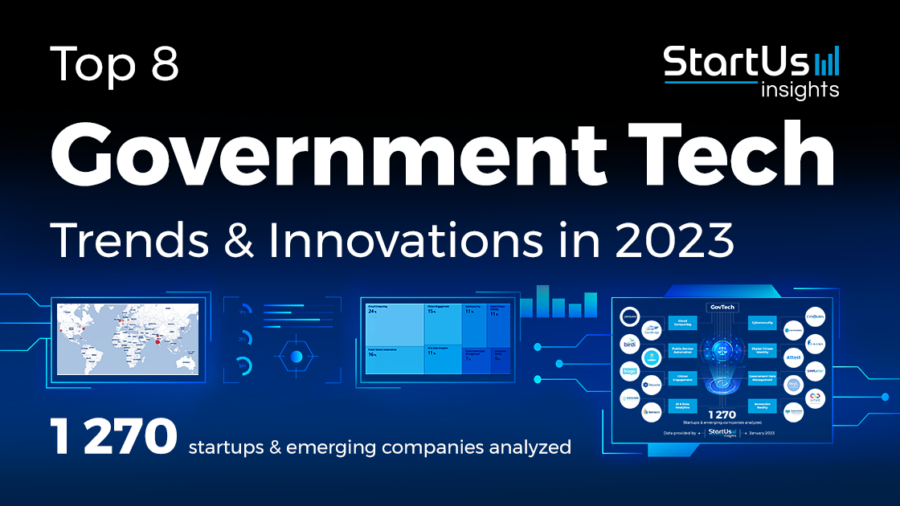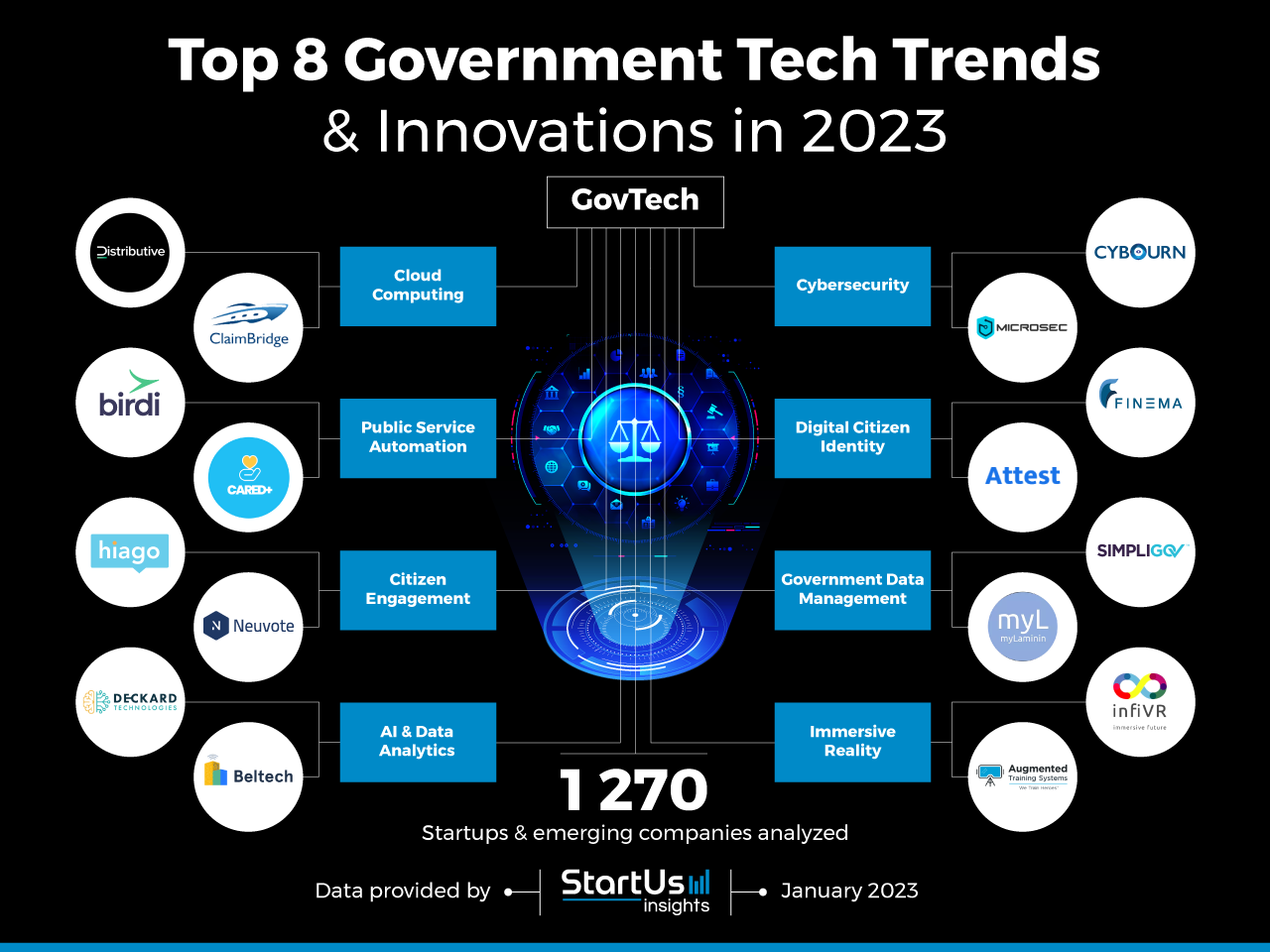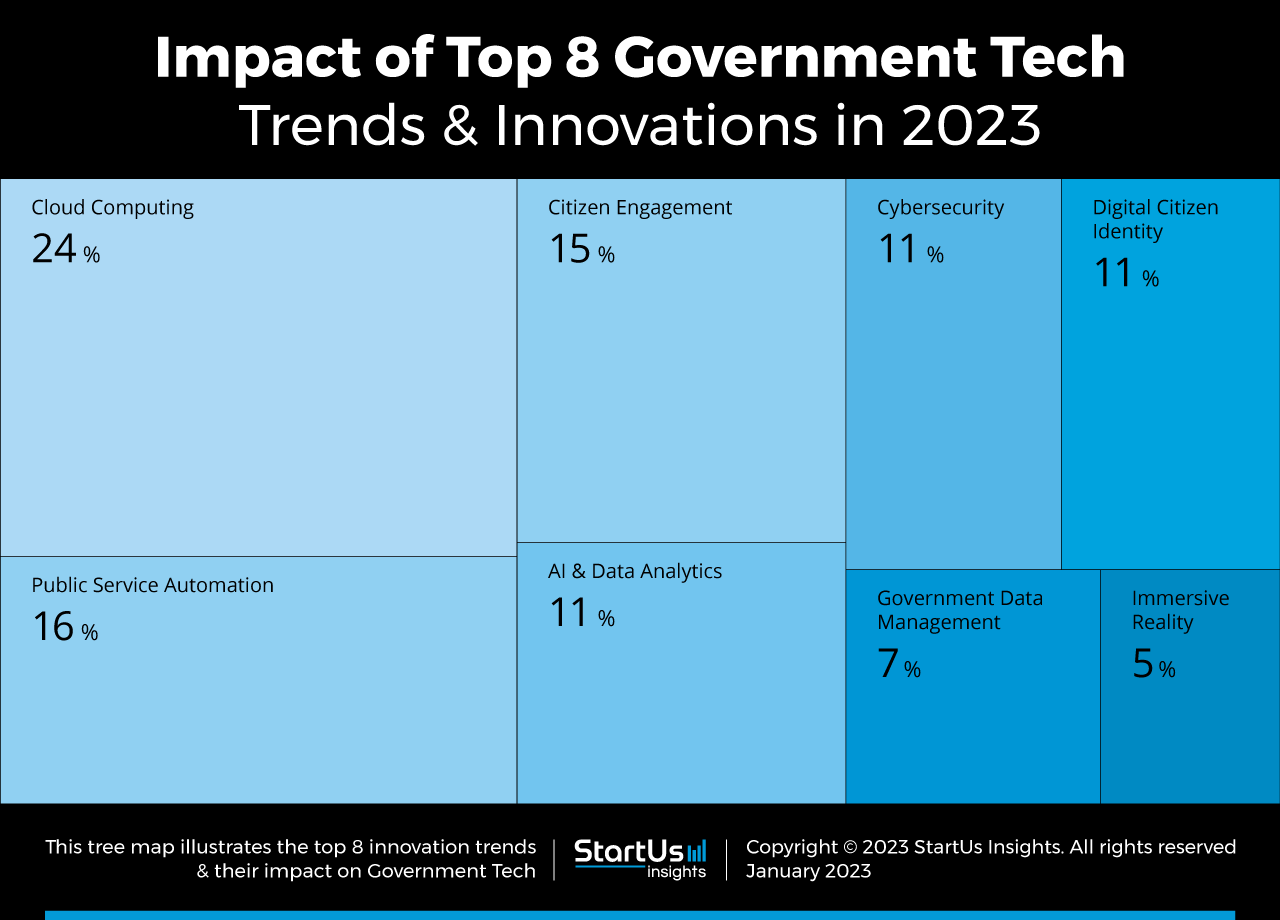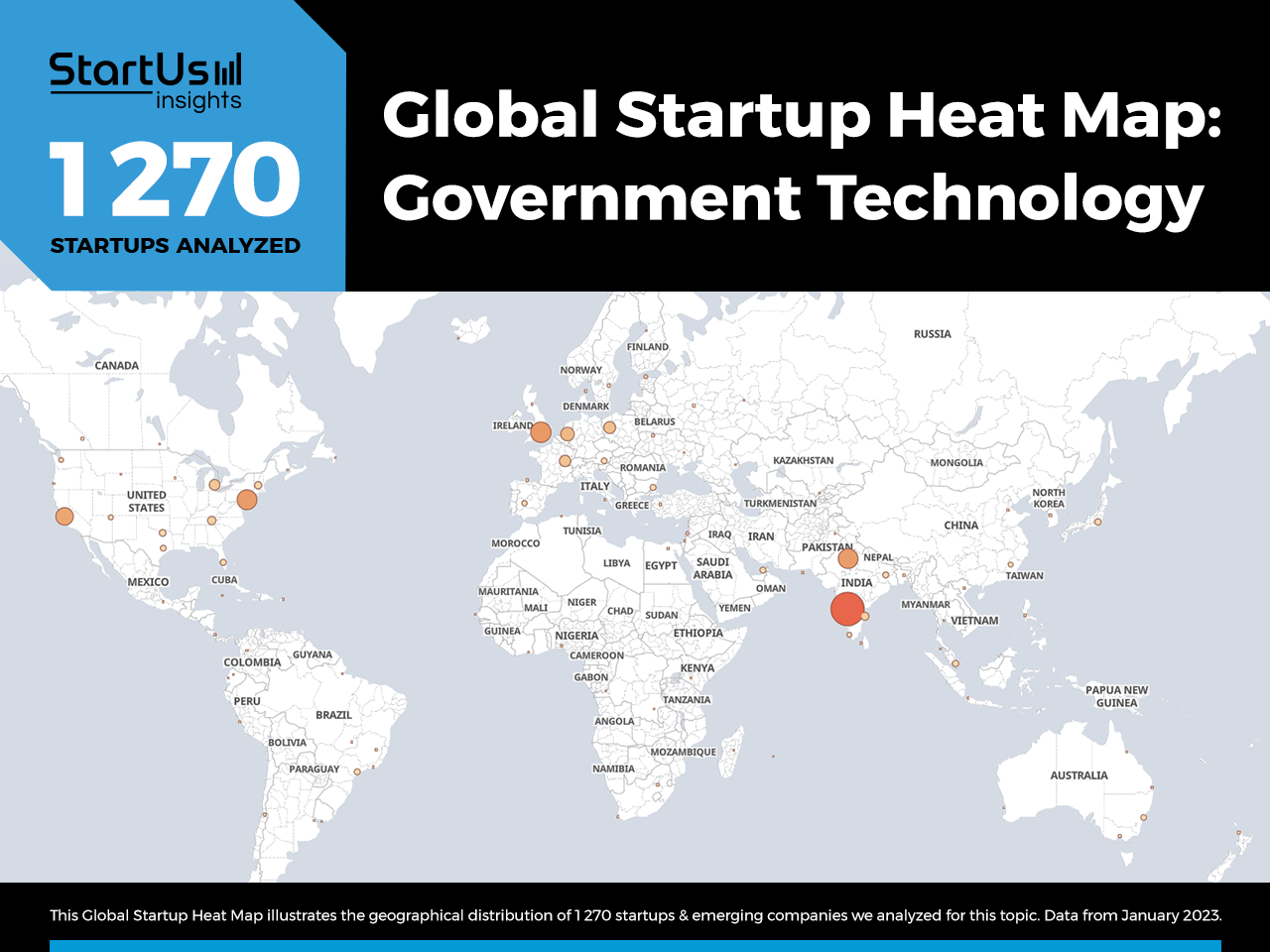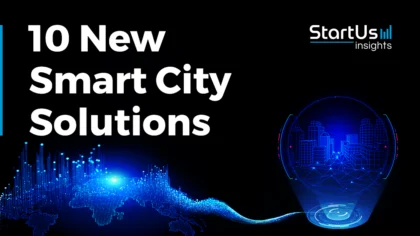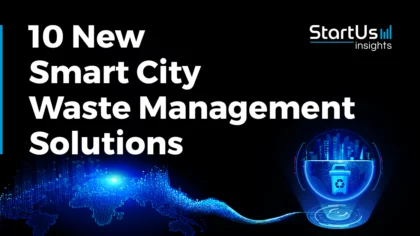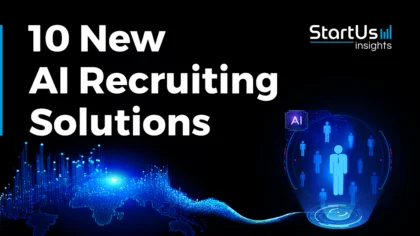Many publicly funded agencies and organizations continue to rely on decades-old processes to accomplish their tasks. Modernization and digital transformation of such processes reduce handling delays, thereby securing and increasing the efficiency of the whole process. For example, automating citizen onboarding workflows speeds up operations while ensuring citizen satisfaction. In this article, we provide you with the top government tech trends and innovations that affect local, state, and federal agencies.
Innovation Map outlines the Top 8 Government Tech Trends & 16 Promising Startups
For this in-depth research on the Top 8 Government Tech Trends & Startups, we analyzed a sample of 1 270 global startups and scaleups. The result of this research is data-driven innovation intelligence that improves strategic decision-making by giving you an overview of emerging technologies & startups in the government sector. These insights are derived by working with our Big Data & Artificial Intelligence (AI)-powered StartUs Insights Discovery Platform, covering 2 500 000+ startups & scaleups globally. As the world’s largest resource for data on emerging companies, the SaaS platform enables you to identify relevant startups, emerging technologies & future industry trends quickly & exhaustively.
In the Innovation Map below, you get an overview of the Top 8 Government Tech Trends & Innovations that impact 1 270 companies worldwide. Moreover, the Government Tech Innovation Map reveals 16 hand-picked startups, all working on emerging technologies that advance their field.
Top 8 Government Tech Trends
- Cloud Computing
- Public Service Automation
- Citizen Engagement
- AI & Data Analytics
- Cybersecurity
- Digital Citizen Identity
- Government Data Management
- Immersive Reality
Tree Map reveals the Impact of the Top 8 Government Tech Trends
Based on the Government Tech Innovation Map, the Tree Map below illustrates the impact of the Top 8 Government Tech Trends in 2023. With cloud technology, governments are integrating multiple data sources to mitigate silos and improve transparency. It also enables analytics that facilitates public service automation, freeing officials from repetitive and predictive human tasks. To further enhance performance, federal agencies use AI and analytical models. Besides, citizen engagement technologies provide federal agencies the tools to develop citizen-centric solutions such as public health surveillance. Many digital citizen identity solutions also allow the government to certify and authenticate individual identities and health statuses. Additionally, the GovTech sector is improving the security of sensitive data through cybersecurity and data management measures.
Global Startup Heat Map covers 8 Government Tech Startups & Scaleups
The Global Startup Heat Map below highlights the global distribution of the 1 270 exemplary startups & scaleups that we analyzed for this research. Created through the StartUs Insights Discovery Platform, the Heat Map reveals that India sees the most activity among GovTech startups.
Below, you get to meet 16 out of these 1 270 promising startups & scaleups as well as the solutions they develop. These 16 startups are hand-picked based on criteria such as founding year, location, funding raised, and more. Depending on your specific needs, your top picks might look entirely different.
Top 8 Government Tech Trends for 2023
1. Cloud Computing
Cloud computing offers flexibility and better collaborative opportunities for government agencies. It solves the challenges such as in-house server, hardware, and software maintenance and data protection. As part of the legacy modernization, cloud computing also saves costs when there is a need for more data storage and computing. Additionally, it secures the fragile data that is otherwise vulnerable to disasters. Since commercial cloud systems enable anything-as-a-Service (XaaS), the government is able to provide a variety of citizen-centric services through online platforms. Further, cloud-based services allow government officials to concentrate on administrative tasks instead of data security and tampering.
Distributive develops a Distributed Compute Protocol (DCP)-based Cloud
Distributive is a Canadian startup that makes a DCP-based cloud. It is a distributed high throughput computing framework that allows governments and enterprises to distribute data processing, predictive analytics, and numerical simulations. DCP cloud sidesteps large data transfer fees charged by public cloud operators and reduces compute costs. Municipalities leverage this technology for developing economic and epidemiological models for scenario planning.
Claim Bridge Technologies provides a Cloud-based E-voting Platform
Indian startup Claim Bridge Technologies offers PollBag, a cloud-based e-voting platform. It allows users to create and manage online elections. The platform encrypts every digital ballot to avoid vote tampering before reaching the ballot box. Moreover, it is easily accessible and ensures the anonymity of voters’ choices. Democratic governments with different levels of elections save time and money using this platform, and it also offers real-time stats of live voting events.
2. Public Service Automation
Due to the expanding workloads and budget constraints in staff resources, government agencies are moving towards more efficient processes. Additionally, the large amounts of labor-intensive manual processes cause potential bottlenecks. That is why the government sector is integrating intelligent automation or hyper-automation. Such technologies use robotic process automation (RPA) to streamline rules-based and structural manual tasks. Public service automation also leverages software robots to handle repetitive tasks. Further, governments find benefits in automating inspection through drones for public service and infrastructure planning.
Cared+ devises Digital Health Identity Software
Cared+ is an Indonesian startup that develops digital health identity software. It allows community members to self-screen themselves and monitor their health conditions. This enables government organizations to manage crowds, especially in cases of communicable diseases such as COVID-19. As a result, it prevents pandemics while providing traceability of transmission.
Birdi offers Community Structure Inspection Drones
Australian startup Birdi makes community structure inspection drones. They capture images of the assets and structures and upload the data into the startup’s visualization software. It provides the data as on-map image previews that showcase the damage and repair points. Federal agencies leverage this solution to attain greater visibility over critical infrastructures such as power and utility systems.
3. Citizen Engagement
Engaging citizens to co-create solutions helps governments identify citizens’ needs as well as enables citizens to point out issues and suggest changes. The sector is combining digital tools for communication, service delivery, and political processes to improve civic engagement. Traditionally, the main challenge for governments is in reaching a large number of citizens and for a wide variety of issues. Through easily accessible interfaces such as mobile apps or web platforms, government agencies are able to better connect with individuals. It also fetches relevant data for the governments to enable better decision-making, public policies, and social changes.
Hiago creates Civic Engagement Software
Hiago is a US-based startup that develops civic engagement software. It offers features such as live queuing and commenting on virtual meetings while providing a language of choice. The software analyses public comments and keeps the communication channels open between governments and citizens as well as citizens and citizens. As a result, it enables governments to ensure a citizen-centric decision-making process.
Neuvote Systems offers Civic Management Platform
Canadian startup Neuvote Systems offers Civik, a civic management platform. It allows voters to connect with each other and make their voices heard. The platform also provides news, discussion, and opinion forums that allow government representatives to better understand public issues. Moreover, it enables users to file digital petitions. Governments use this platform for conducting online elections and collecting community-specific insights.
4. AI & Data Analytics
Government organizations depend on AI and data analytics to drive critical decision-making. Initially, federal agencies utilized these tools to transform vast amounts of disparate data into usable datasets. AI enables automating tedious and routine tasks within the public sector. Further, the government and public sectors are now leveraging machine learning (ML) predictive models to comprehend public needs through neural networks and deep learning. They also support critical capabilities such as increased situational awareness by automating safety, predicting failures, and planning military equipment maintenance. Additionally, AI empowers security by identifying suspicious online activities and escalating them to appropriate law enforcement agencies.
Deckard Technologies provides Real Estate Regulatory Software
Deckard Technologies is a US-based startup that makes a real estate regulatory software platform. It collects and analyses residential images and data points using machine learning algorithms and analytics. The platform then updates the valuation of the property based on the analysis and allows citizens to pay property taxes. The city planning and regulation arm of governments use this platform to attain regulatory oversight.
Beltech AI empowers Smart Public Infrastructure
Indian startup Beltech AI empowers smart public infrastructure. The startup leverages AI to automatically detect garbage and track the person, place, and time of littering. Additionally, it identifies public infrastructure damages, such as potholes and damaged pavements, and alerts respective authorities. The authorities further use the AI platform to monitor the efficiency of relevant contractors in fixing these issues.
5. Cybersecurity
Governments store a large amount of data and often on older and vulnerable systems. Malicious attackers steal this information to demand money and disrupt the delivery of vital public services. The recent rise in cyber attacks against critical infrastructure also forces government agencies to protect the data against intruders while ensuring ease of access to all stakeholders. To combat these issues, federal agencies are combining cybersecurity technologies at four different steps – edge deployments, networks, data centers and cloud environments, and supply chains. To achieve this, the public sector uses intrusion detection systems (IDS), intrusion prevention systems (IPS), network monitoring tools, behavior analytics, and more.
CyBourn creates Threat Detection Software
CyBourn is a UK-based startup that offers EtherLast, a threat detection software solution. It is an extended detection and response (XDR) platform that navigates through vulnerabilities and tracks the patching status. The platform also visualizes ticket breakdowns on the performed actions. Additionally, it is adaptable, customizable, and provides real-time health data of infrastructure. City governments use this technology to monitor critical assets and for receiving alerts in case of security breaches.
MicroSec makes a Cyber Protection System
Singaporean startup MicroSec develops an internet of things (IoT) cyber protection system. The startup’s product, Micro-IDS, is a lightweight intrusion detection system for IoT devices that uses machine learning models. It fingerprints the unique behavior of devices and triggers instant remediation upon detecting anomalies. This technology enables governments to protect smart cities, connected buildings, and critical infrastructure from unauthorized access.
6. Digital Citizen Identity
Digital citizen identities comprise unique personal attributes and identifiers that enable online verification of individuals without paper documentation. Federal agencies leverage these IDs to provide convenient and easy access to government and private services while also providing ownership over personal data. It also streamlines administration processes and opens citizen engagement channels. For example, governments rely on e-passport that uses face recognition to enable smart borders across the world. On the other hand, digital ID wallets use mobile apps to securely store digitized and encrypted versions of documents such as driving licenses and health credentials.
Finema facilitates Automated Identity Proofing
Finema is a Thai startup that automates identity proofing. The startup uses AI and computer vision for facial comparison and liveness detection. It also assesses authenticity and utilizes optical character recognition (OCR) to read scanned documents. Traffic control departments leverage this technology to issue verifiable digital car registration and driving licenses.
Attest provides an Identity Management Toolkit
US-based startup Attest offers an identity management toolkit. It uses cryptographic key-based authentication and digital signatures while entering the app. The toolkit also provides single-sign-on and passwordless registration across apps. This allows institutions to authenticate citizens using a variety of factors, including SMS, email, and push notifications. Federal agencies use this solution to integrate citizen data protection at the app level.
7. Government Data Management
Effective use of government data simplifies the delivery of public services, reduces fraud and human error, and accelerates massive operational efficiencies. Despite these benefits, governments remain largely unable to capture the opportunity due to the fragmented nature of this data. To tackle this, governments are now developing interoperable and connected data software that combines data across government entities. Such solutions, in turn, improve crisis management, public health monitoring, and infrastructure management. This also empowers data reuse within different arms of the government. GovTech startups are also moving to blockchain-based data management to improve transparency and security.
SimpliGov makes Citizen Data Privacy Software
SimpliGov is a US-based startup that creates citizen data privacy software. It protects health-related and credit card-related citizen data through encryption and firewall monitoring. Moreover, the software’s signature processes comply with security certification and anti-tampering controls. Data protection wings of the government leverage this technology for multi-authenticated public data protection.
myLaminin builds an Encrypted Document Sharing System
UK-based startup myLaminin provides an encrypted document sharing system. It uses blockchain to encrypt the personal documents of citizens. The system also provides flexibility in the choice of algorithms and supports several distributed ledger technology (DLT) platforms. This enables immutable storage of data from local, state, and central governments into a single digital wallet, allowing the public sector to accelerate document verification.
8. Immersive Reality
Government agencies leverage immersive reality technologies for a wide variety of applications ranging from firefighting and social services to increased accessibility of public services. However, the key application is to improve staff and first responder training, especially for emergency responses. With virtual reality (VR) the first responders are able to train at their convenience and it exposes trainees to more diverse scenarios. Transportation ministries promote the use of augmented reality (AR) for public transportation to aid physically challenged and people with visual impairments. For instance, AR-enabled navigation apps enable enlarged signage laid over an actual image of a bus depot or train station. Immersive technologies also target social issues such as discrimination and racism by making citizens more empathetic through simulations.
InfiVR creates Defence Training Systems
InfiVR is a US-based startup that offers defense training systems. The startup leverages VR for flight simulation, medical training, and battlefield situation. It also uses AR to feed the trainees with real-time information such as opponent position and escape routes. These features enable defense departments to locate hidden targets through a connected command center.
Augmented Training Systems provides Emergency Training Analytics
US-based startup Augmented Training Systems provides HERO, an emergency training analytics platform. It tracks the speed and accuracy of individual tasks, monitors the training completion, and sends feedback to the trainees. This reduces the cost and time associated with training sessions as well as provides on-demand performance metrics. Emergency responding teams leverage this solution to identify trouble spots and improve training efforts.
Discover all Government Tech Trends & Startups
The biggest trend in government technology is the gradual but steady global growth in digital transformation. The legacy modernization of federal agencies fuels disruptive activities in cloud computing, cybersecurity, data management, and analytics. AI is set to transform massive public datasets into actionable policy. To promote citizen engagement, governments need agility and inclusion while adopting new technologies. GovTech will become an integral part of financial optimization, service delivery, human resources management, and many other arms of the public sector.
The Government Tech Trends & Startups outlined in this report only scratch the surface of trends that we identified during our data-driven innovation and startup scouting process. Among others, civic engagement and process automation solutions will transform the sector as we know it today. Identifying new opportunities and emerging technologies to implement into your business goes a long way in gaining a competitive advantage. Get in touch to easily and exhaustively scout startups, technologies & trends that matter to you!
